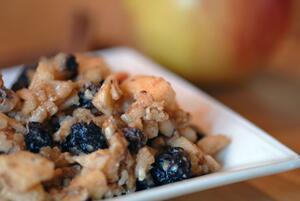Eating Jewish: Charoset medley
Charoset medley.
Image courtesy of Elana's Pantry.Although most, if not all, Jewish holiday meals use certain foods and dishes to symbolize various elements of the celebration, the seder meal does so in a way that is integral to the ritual of the meal itself. From the maror to the zeroah, each has its place in the structure of the seder. Of all these symbolic foods, charoset is definitely my favorite and I have to agree with Gil Marks when he says in the Encyclopedia of Jewish Food that it “is unquestionably the most flavorful and arguably everyone’s favorite of the seder foods.”
In the Encyclopedia of Jewish Food, Gil Marks explains that charoset was widely used within the Jewish community at the time of the Mishnah, around 200 CE. As with many of the elements of the seder meal, the custom of including charoset in Passover celebrations was influenced by the practices of the Greco-Roman nobility two thousand years ago. The Roman elite would have a dressing or condiment to accompany the greens they ate at their meals and, in turn, charoset was most probably modeled upon the fruit relishes that were served at Roman symposiums. Thus, coupled with the customs of dipping the karpas at the beginning of the seder as well as reclining during the seder, the charoset is used to create a feeling of affluence and uniqueness.
Although most people are probably most familiar with traditional Ashkenazic charoset made of apples, walnuts, honey, cinnamon and sweet red wine or grape juice, there are many other charoset recipes that reflect the places around the world where Jews have settled. One can find Persian, Italian and even Surinam charoset (these recipes can be found at the end of this post), and use a variety of ingredients such as chestnuts, grated coconut and ground cardamom. These different varieties of charoset are a great way to bring a taste of these various Jewish communities to your seder table alongside your own family’s traditional charoset.
Israeli Charoset
From Gil Marks’ Encyclopedia of Jewish Food
2 medium apples, peeled, cored and grated
2 medium bananas, mashed
14 pitted dates, chopped
1/3 cup blanched almonds, ground
¼ matza meal
Juice and zest of ½ lemon
Juice and zest of ½ orange
1 teaspoon ground cinnamon
Sugar or honey to taste
¼ cup sweet red wine
In a medium bowl, combine all the ingredients, adding enough wine to make a paste.
Persian Charoset
From Gil Marks’ Encyclopedia of Jewish Food
½ to 1 teaspoon ground cinnamon
¼ to ½ teaspoon ground ginger or 1 to 2 teaspoons grated fresh ginger
¼ teaspoon ground cardamom or to taste
¼ teaspoon ground coriander or to taste
1/8 teaspoon ground cloves or to taste
2/3 cup pomegranate juice
2 medium apples, or 1 medium apple and 1 medium pear, cored and grated
1 cup pitted dates, ground
½ to 1 cup raisins
½ cup ground almonds
½ cup ground pistachios
½ cup ground walnuts
Juice and zest of ½ lemon, or 2 tablespoons red wine or cider vinegar
About 2/3 cup sweet red wine
In a medium bowl, combine the cinnamon, ginger, cardamom, coriander, and cloves, then stir in the pomegranate juice to dissolve spices. Mix in the remaining ingredients.
Italian Charoset
From Gil Marks’ Encyclopedia of Jewish Food
1 ¼ cups (6 ounces) dried chestnuts
2 medium apples, or 1 apple and 1 pear, cored and peeled
1 ¼ cups pitted dates
1 ¼ cups dried figs or pitted dried plums
1 cup raisins
1 cup blanched almonds, finely chopped
About 1 teaspoon ground cinnamon
About 3 tablespoons orange juice
About 3 tablespoons fruity dry red wine
-
Place chestnuts in a medium saucepan and add water to cover. Bring to a boil, reduce the heat to low, and simmer until tender, about 1 ½ hours. Drain and pat dry.
-
In a food processor or meat grinder, chop the chestnuts, apples, dates, figs, and raisins. Mix in the almonds, cinnamon, orange juice, and wine.
Surinam Charoset
From Gil Marks’ Encyclopedia of Jewish Food
3 ¼ cups (8 ounces) unsweetened grated coconut
2 cups ground almonds or walnuts
2 2/3 cups dried apples, coarsely chopped
1 1/3 cups dried apricots, coarsely chopped
2 cups dried pears, coarsely chopped
1 1/3 cups dried plums, coarsely chopped
1 ½ cups raisins
¼ cup sugar
2 to 3 teaspoons ground cinnamon
1 to 2 teaspoons grated fresh ginger (optional)
About 3 cups water
½ cup cherry preserves
About 2/3 cup sweet red wine
In a large, heavy pot, combine the coconut, nuts, apples, apricots, pears, plums, raisins, sugar, cinnamon, and, if using, ginger. Add the water to cover. Bring to a boil, reduce the heat to medium-low, and simmer stirring frequently and adding more water if necessary, until the coconut and fruits soften and the mixture thickens, about 1 ½ hours. Stir in the preserves. Let cool for about 15 minutes, then stir in the wine to moisten. Let cool completely. The mixture should be moist, so if it looks dry, stir in a little additional wine.








I posed your question to the internet via Twitter, and some suggestions are to use apple juice, prune juice, organic wine (has no sulfates) or tequila (if you're feeling excited).
For the Persian charoset, I would increase the amount of pomegranate juice to replace the wine that's called for. Perhaps other replacements could be cranberry juice or apple juice (the natural kind, which is darker than most apple juices you see in grocery stores). I think any juice that is slightly sweet would work well. I hope this helps!
My mouth is watering!! I am allergic to sulfites, so can't use wine or grape juice. What else do you suggest? The Persian charoset sounds divine!